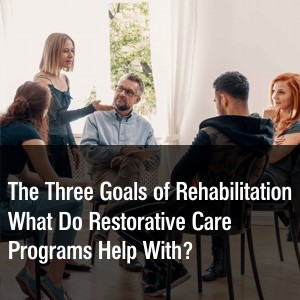As a senior psychiatrist and professor in a reputable medical university, I have witnessed firsthand the remarkable impact of rehabilitation on patients’ lives. Today, I want to explore the three primary goals of rehabilitation and their profound significance in the journey towards recovery and improved quality of life.
Rehabilitation should be seen as an essential service offered across all levels of the healthcare system. Many people without long-term impairments will need rehabilitation services at some point in their lives. Similarly, many people with long-term impairments do not constantly require rehabilitation services. For instance, individuals with spinal cord injuries may initially need intensive rehabilitation, but once they have received sufficient therapy and assistive devices, they may not require additional services. Episodic rehabilitation may also be necessary for individuals with conditions such as depression or degenerative diseases.
What are the primary objectives of rehabilitation programs and therapy?
Rehabilitation programs cater to the diverse needs of individuals, offering customized support that aligns with each person’s unique requirements. The overarching goal of these programs is to promote independence through therapeutic interventions. However, they encompass a range of additional objectives, including:
- Overcoming challenges related to balance and coordination
- Regaining movement, strength, and endurance
- Involving family and friends in the rehabilitation process for support
- Identifying potential employment opportunities
- Overcoming barriers that hinder daily life activities.
- Enhancing cognitive abilities and mental functioning
- Managing and reducing pain levels
- Promoting emotional well-being and psychological resilience
- Facilitating social integration and participation in community activities
- Providing education and training on self-management techniques for long-term success
- Assisting individuals in adapting to life with a disability
- Enhancing mobility and physical capabilities
- Improving communication skills across various aspects of life
- Restoring self-care abilities such as dressing and bathing
- Addressing swallowing, feeding, and nutritional needs
Goals for Rehabilitation

The overarching goals of rehabilitation are to restore independence, alleviate pain, manage symptoms, and promote functional recovery. By setting realistic and measurable goals, rehabilitation professionals guide patients towards optimal outcomes.
Dr. Viktor Frankl, a psychiatrist and Holocaust survivor, emphasized the importance of goals in rehabilitation: “What man actually needs is not a tensionless state but rather the striving and struggling for a worthwhile goal, a freely chosen task.”
At the individual level, patients actively participate in goal setting, ensuring that their aspirations and preferences are considered. Dr. Elisabeth Kubler-Ross, a renowned psychiatrist, once said, “The most beautiful people we have known are those who have known defeat, known suffering, known struggle, known loss, and have found their way out of the depths. These persons have an appreciation, a sensitivity, and an understanding of life that fills them with compassion, gentleness, and a deep loving concern. Beautiful people do not just happen.”
Rehabilitation is a highly person-centered health strategy where treatment caters to the underlying health conditions as well as the goals and preferences of the user. Information on functioning is essential to decision-making in rehabilitation at all levels of the health system since the goal of rehabilitation is to optimize functioning in light of impairments, injuries, and acute or chronic diseases.
Acute Rehab Goals
During the acute rehabilitation phase, the primary goals revolve around stabilizing medical conditions, preventing complications, and initiating the recovery process. Rehabilitation teams work closely with other healthcare professionals to provide comprehensive care.
Dr. Albert Schweitzer, a physician and Nobel laureate, emphasized the importance of early intervention: “Success is not the key to happiness. Happiness is the key to success. If you love what you are doing, you will be successful.” Acute rehabilitation focuses on regaining basic functional abilities and minimizing impairments, enabling patients to love the process of recovery and embrace their journey towards success.
Short-Term Goals for Rehabilitation
Short-term goals are pivotal in driving progress throughout the rehabilitation process. These goals act as milestones, providing patients with a sense of achievement and motivation. With ongoing assessment and adjustment, patients continuously strive towards their desired outcomes.
Dr. Carl Rogers, a renowned psychologist, believed in the power of short-term goals: “The curious paradox is that when I accept myself just as I am, then I can change.” Short-term goals promote self-acceptance and create a foundation for transformative change.
Rehabilitation occurs across the life-course, from newborns to end-of-life, and can be applied before a health condition (prehabilitation), during acute care, post-acute care, and long-term care. Rehabilitation interventions are provided by various health and non-health professionals, as well as individuals, their families, and carers. By restoring, preventing, or slowing deterioration in functioning, rehabilitation places the person at the center of the process, helping individuals reach their full potential and encouraging active participation in society.
What Do Restorative Care Programs Help With?
Restorative care programs, designed to meet the unique needs of each patient, play a crucial role in facilitating physical, cognitive, and emotional recovery. These programs take a comprehensive and patient-centered approach, helping individuals regain their independence and improve overall functionality.
As Dr. William James, a renowned psychiatrist, once said, “The greatest revolution in our generation is the discovery that human beings, by changing the inner attitudes of their minds, can change the outer aspects of their lives.” Restorative care programs empower patients to change their inner attitudes and embrace the journey of rehabilitation.
Conclusion
In conclusion, the three goals of rehabilitation—restorative care, overarching goals, and short-term goals—form the pillars of effective rehabilitation programs. Restorative care programs help individuals regain their independence and improve overall functionality. Overarching goals encompass the restoration of independence, alleviation of pain, management of symptoms, and promotion of functional recovery. Short-term goals act as milestones, driving progress and instilling a sense of achievement.
As a senior psychiatrist and professor, I remain dedicated to advancing the field of rehabilitation and witnessing the extraordinary transformations it brings to patients’ lives. In the words of Dr. Oliver Sacks, a renowned neurologist and psychiatrist, “Every act of perception is, to some degree, an act of creation.”
